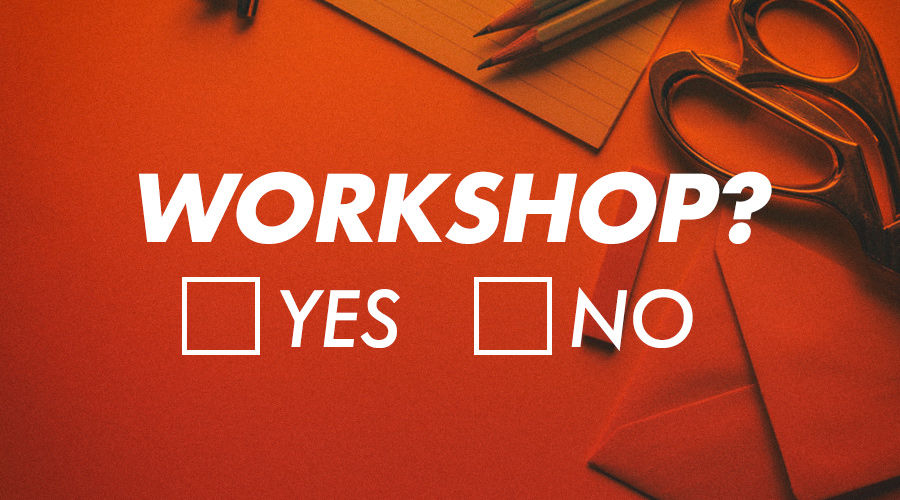I don’t know about you, but it seems like every time I turn around these days, I hear these words:
“We need to have a workshop!”
To which I often say, “Great! What do you hope to accomplish in this workshop?”
[Note: The answer to this simple question is critical – because designing a workshop all starts with the outcomes that must be achieved before leaving the room. Unfortunately, the path to answer this question is often winding. In this article, I’ll share some of the typical responses I hear to this question as well as tips I use when organizing a productive workshop in hopes that you, the reader, might steal some of these ideas!]
Let’s resume the conversation:
Me: “Tell me again, what do you hope to accomplish in this workshop?”
Person: “Oh, we just need to get some people in a room to have a deeper conversation.”
Me: (In my head)… “Uh…well, that’s not really a workshop. That’s more like a meeting.”
Me: (Out loud) “Oh! That sounds like a good use of a meeting! Creating alignment or simply discussing an issue can be a worthwhile use of time and purpose in some instances. On the other hand, if there is a problem to be solved and decisions to be made, a workshop can be a powerful tool… but there are some keys to running a successful workshop that are so often overlooked.…the first of which is that actual work has to be done before, during and after the workshop to make it run smoothly. It’s not as simple as developing a detailed agenda of things to discuss. And, unfortunately, structuring the workshop can take some time.”
Person: “Well, I don’t have a lot of time. I just want to get some people together and talk about issue X.”
Me: “What is it specifically about issue X that would be addressed in this workshop?”
Person: “Well, it seems like there are differences of opinion on everyone’s understanding of issue X and we need to develop a shared understanding and plan of what to do next.”
Me: “Those sound like great objectives. How do you plan to get there in the discussion?”
Person: “I have no idea.”
Me: “Have you talked to anyone who you’re inviting to this meeting about what you hope to accomplish and get their ideas?”
Person: “No, I don’t want many opinions going in. I just want people to show up fresh.”
Me: “Well sometimes it can help to know where everyone stands if you want to bring them together. Maybe some pre-work would be good.”
Person: “I guess, maybe. But I think I already know the answer.”
Me: “Are you considering sharing your ideas with the group and getting feedback?”
Person: “No, I don’t want them to think that I have it all figured out. I want to create buy in.” (In my head…another buzz word!)
Me: “Ah, that makes sense… do you have time to do that or do you need to get to a decision quickly?”
Person: “Oh quickly for sure. I only have four hours with this group and I owe this plan to my boss.”
Me: “So do you think creating a straw man plan in advance might help expedite that conversation?”
Person: “Maybe, but I haven’t had time to pour my thoughts out on paper.”
Me: “Hm… that pre-work might be necessary. Let’s say you did that, have you given thought on how to guide the conversation around your proposed solution to gain understanding and buy in?”
Person: “No, that’s why I think we just need to discuss as a group.”
…at which point we pause… go to the white board…
Me: “Let’s start mapping out the agenda together. Working backwards from your end goal might be good so we can determine how to make the best use of the time.”
Yikes!
At some level this fictional conversation is an exaggeration, but it’s not too far off from the things I hear more and more everyday. Since when did “workshop” become such a buzz word? Collaboration is great (and powerful) but only if it’s structured and productive. Otherwise it’s just people sitting in a room talking.
If you are feeling my pain here… and hear this exchange in your organization… here are a few pointers to help you with this same conversation.
- Pre-work is critical. If the leader of a meeting isn’t willing to “do the work” in advance of the meeting – don’t have the meeting. Period. What does this mean? Well, it can mean talking to participants to get perspective, reviewing past research or work to date, organizing a PowerPoint deck structured around key conversations, planning exercises and break-out groups, creating a detailed and timed agenda, etc. In general, we say that every hour of workshop time takes three hours of prep time. Plan ahead for this and engage the right team to support this work.
- Stock exercises only go so far. My opinion is probably jaded here… but have you ever hired a consultant and thought that maybe they opened a book of icebreaker exercises and picked one? …Look, in my mind, workshops are about getting down to business. And while that doesn’t mean you can’t have fun (in fact, you should!) – conceptual or open-ended exercises that are routine and “un-customized” usually create more frustration than engagement. …especially if the group feels they’re rehashing educational issues or concepts they are already aware of. Just be cautious and know your audience. Too many “off the shelf” activities can cause teams to shut down – the exact opposite feeling of energy you want in a room full of smart people!
- Don’t be scared to show current state thinking. Probably my biggest point of frustration is allowing too much “blue sky” time without something tangible to have a conversation around. A skilled facilitator should bring ideas to the meeting. That doesn’t mean they should be “presented” as the only or best solution, but rather – there should be visual aids to support the critical conversations. The key here is – there has to be time to poke holes in these solutions. If there’s not, it can seem as though it’s more of a “presentation” than a “workshop” – again, a big no, no in my mind. If you’re not the person with the ideas – bring in the subject matter experts, and create time for them to talk.
- Make a plan together in the room. I’m a big believer in never leaving a room without a game plan. As a facilitator, it’s your job to ensure there is enough time in the agenda to assign action items, deadlines and ensure commitment by those in the room. If this doesn’t happen, the workshop attendees can feel frustrated that they’ve invested all of their time but have no clear conclusions or outcomes. This exercise alone creates great buy-in, as all the players are vested in the plan… but tell them early on (perhaps even before the meeting) that you’ll be asking for their help! Make sure they are willing before they get a seat at the table.
- Pull in the expert facilitator. Let’s face it, not everyone is good at running a workshop. The skill set you’re looking for needs to include someone who can quickly aggregate and organize information as the group is reporting out their ideas while at the same time “pointing” the group’s feedback to the ultimate end goal of the workshop. It requires a person who can “hold a lot in their head” at one time. Look for the drivers in your organization, as they are usually best at this and when urgency is key, they will get it done. Sometimes, there is a tendency to think that detail oriented planners are the best at this. Fact is, they are better at running a “meeting” but may get too lost in the weeds to run a workshop. If you have someone who can both “drive” and “see details” – that’s your person. Help them grow this skill!
There are many other best practices to consider around workshops such as structuring a sound agenda, asking for feedback about how the meeting is going, learning to prioritize ideas, and more. Over time, having an organizational “tool box” of exercises/agendas that can be used for meetings and workshops is an awesome goal. If that seems far off for you – maybe start by just doing one workshop, and doing it really well.
You’d be amazed how leading a productive and collaborative workshop can shine a spotlight on your work (and you!). A great way to be seen and heard, and make friends with others throughout your company – who you just might need to leverage for help everyday.
Good luck – and happy workshopping.





